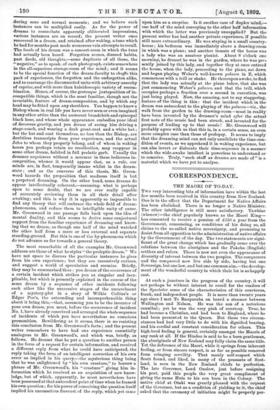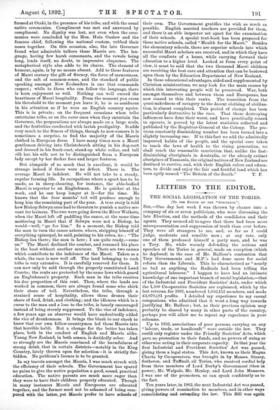CORRESPONDENCE.
THE MAORI OF TO-DAY.
Two very interesting bits of information have within the last few months been received in this country from New Zealand. One is to the effect that the Department for Native Affairs- has been abolished. There is no longer a Native Minister.. The other intelligence is still more satisfactory. Tawhiao- (wheeow)—the chief popularly known as the Maori King— has consented to receive a pension of 2:250 a year from the Government, renouncing, as conditions of his doing so, all claims to the so-called native sovereignty, and promising to desist from all opposition to the administration of native affairs. by the Government of the day. The two statements are signi- ficant of the great change which has gradually come over the relations between the aborigines and the Pa.keha (English> settlers and rulers. There is now not even the appearance of diversity of interest between the two peoples. The conquerors. and the conquered now live side by side, having but one- Sovereign, but one law, and but one common aim,—the develop- ment of the wonderful country in which their lot is so happily cast.
At such a juncture in the progress of the country, it will not perhaps be without interest to recall for the readers of the Spectator some of the characteristics of this courteous, frank, and independent people. It is more than twenty years. ago since I met Te Rauparaba on board a steamer between Wellington and Nelson. He was the son of a notorious. cannibal ; yet he was the very pink of courtesy. True, he had become a Christian, and had been to England, where he had been presented to the Queen. But these two circum- stances had had very little to do with his dignified bearing, and his cordial and constant consideration for others. This high-bred feeling is general, certainly amongst the Maoris of any rank at all. If the Hindoo is said to be a born gentleman, the aboriginals of New Zealand may fully claim the same title Yet the deference of the Maori, while it springs from inherent feeling, or from sincere respect, is as far as possible removed from cringing servility. That manly self-respect which Scott found, and liked, in many of the peasants of Scot- land, is seen in the New Zealand chiefs to perfection. The late Governor, Lord Onslow, just before resigning his post, paid this people the very great compliment of giving the name Hula to his son born in the Colony. The native chief at Otaki was greatly pleased with the request of the Governor, but as a condition of yielding to it, the chief asked that the ceremony of initiation might be properly per-
formed at Otaki, in the presence of his tribe, and with the usual native ceremonies. Compliment was met and answered by compliment. No dignity VMS lost, not even when the cere- monies were concluded by the Hon. Huia Onslow and the famous chief, following the national custom, rubbed their -noses together. On this occasion, also, the late Governor found what admirable talkers these Maoris are. The Ian- ,guage, having few harsh consonants, and the vowels being long, lends itself, no doubt, to impressive eloquence. The metaphorical style also adds to its charm. The element of humour, again, is by no means absent. Add to these features of Maori oratory the gift of fluency, the force of earnestness, and the salt of common-sense, and the standard of public -speaking amongst New Zealanders is one that commands respect; while to those who can follow the language, there is keen enjoyment as well. Nothing can well exceed the heartiness of Maori hospitality. From the moment you cross his threshold to the moment you leave it, he is as assiduous in his attention as if he were an English country squire. This is in private; on the frequent occasions when tribe -entertains tribe, or on the rarer ones when they entertain the -Governor, the preparations are always made on a large scale, and the festivities conducted with lavish prodigality. It adds very much to the fitness of things, though to new-comers it is sometimes a surprise, to find the majority of the Maoris -clothed in European dress. I have many times seen a Maori gentleman driving into Christchurch sitting in his dog-cart and dressed in his frock-coat, stand-up white collar, and tall silk hat, his wife not to be distinguished from a European lady except by her darker face and larger features.
But alongside of so much that is excellent, it would be strange indeed if there were no defect. There is. The average Maori is indolent. He will not take to a steady, regular farming life. In occupations where a spurt has to be made, as in sheep-shearing, for instance, the able-bodied Maori is superior to an Englishman. He is quicker at the work, and he can keep longer at it—for the time. He knows that the four months' toil will produce enough to keep him the remaining part of the year. A true story is told how Bishop Selwyn once had to threaten to punish a native ser- vant for laziness. The two were going down the River Waikato, -when the Maori left off paddling the canoe, at the same time muttering in Maori that if Selwyn were not a Bishop, he would—well, "go for him." In a moment, the Bishop told the man to turn the canoe ashore, where, stripping himself of -everything episcopal, he said, pointing to his robes, &c. : "The Bishop lies there ; the man is here ; I am quite ready,—come on." The Maori declined the combat, and resumed his place in the boat without another murmur. There are two causes which contribute to the indolence of the Maori. Taken as a whole, the race is now well off. The land belonging to each tribe is very extensive. It is carefully reserved for them. It can now only be sold through the properly constituted Land Courts ; the rents are protected by the same laws which guard an Englishman's property. Each man in the tribe receives his due proportion of this rent. Then, where the lands are worked in common, there are always found some who shirk -their share of toil. Nevertheless, the tribe, through a -strained sense of hospitality, allows these drones their share of food, drink, and clothing; and the idleness which is a curse to the man and a loss to the tribe, is lamely encouraged instead of being sternly suppressed. To the vice of indolence, a few years ago an observer would have undoubtedly added the vice of drunkenness. It brings the blush to our cheek to know that our own fellow-countrymen led these Maoris into that horrible habit. But a change for the better has taken place, both in the conduct of English and Maoris alike. -Young New Zealand, in both senses, is decidedly sober. And so strongly are the Maoris convinced of the harmfulness of strong drink, that in certain districts—notably in the King 'Country, lately thrown open for selection—it is strictly for. 'bidden. No publican's licence is to be granted.
In my travels amongst the Maoris, I was much struck with the efficiency of their schools. The Government has spared -no pains to give the native population a good, sound, practical -education. The native parents are much more eager than they were to have their children properly educated. Though in many instances Maoris and Europeans are educated together, and the former need not be ashamed of being com- pared with the latter, yet Maoris prefer to have schools of
their own. The Government gratifies the wish as much as possible. English married teachers are provided for them, and there is an able inspector set apart for the examination of their schools. A special text-book has been prepared for these native schools, called "Health for the Maori." Besides the elementary schools, there are superior schools into which successful Maori scholars are received, and in which they have all the comforts of a home, while carrying forward their education to a higher level. Looked at from every point of view, it must be said that the two thousand Maori children are receiving the best care and attention that can be bestowed upon them by the Education Department of New Zealand.
In these educational advantages, aided and supplemented by Christian ministrations, we may look for the main causes by which this interesting people will be preserved. War, both amongst themselves and between them and Europeans, has now ceased to thin their ranks. The transition from the quasi-nakedness of savagery to the decent clothing of civilisa- tion, is almost completed. This period of change has been particularly destructive to the race. That these destroying influences have done their worst, and have practically ceased to operate, is proved by the latest statistics collected and published by the Registrar-General of the Colony. The pre- vious constantly diminishing number has been turned into a slightly increasing one. If to this fact we add the admittedly improved habits of the people, and the special care taken to teach the laws of health to the rising generation, we shall reach the reasonable conviction that, unlike the fast- diminishing aboriginals in Australia, or the already extinct aborigines of Tasmania, the original natives of New Zealand are destined to survive, and, with their English rulers and educa- tors, to divide and enjoy the fair and fruitful land which has been aptly named "The Britain of the South." T. F.



































 Previous page
Previous page